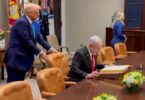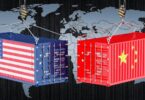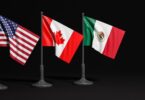CBI Governor Mohammad Reza Farzin made the comment in his meeting with Omani Minister of Commerce, Industry and Investment Promotion Qais bin Mohammad Al Yousef in Tehran.
Suitable ways have been paved for carrying out the trade and economic transactions based on the national unit of currency with trade partners including Oman completely.
The Americans use the dollar as a political tool to pressurize countries while other currencies in the world are significantly growing especially in the Asia region.
He said
In short, ‘The CBI is fully prepared to reduce and ultimately eliminate dollar exchanges from the cycle of commercial and economic transactions between Iran and Oman,’ Mena FN reported.
Furthermore, the Tasnim News Agency reported:
Elsewhere in his remarks, Farzin pointed to the constructive talks held between Iranian and Omani officials on the development of monetary and banking relations and reiterated that Iran is ready to use bilateral and multilateral monetary treaties in trade transactions with Oman and the country’s trade partners.
Emphasizing the use of joint debit cards between the monetary and banking networks of the two countries, he said necessary talks have been held in this regard with the officials of the Central Bank of Oman.
Farzin also referred to the Asian Clearing Union (ACU) Summit, planned to be held in June in Tehran, and noted that the use of bilateral and multilateral monetary treaties between the ACU’s member states will certainly result in increasing trade ties and also removal of dollar exchanges in trade transactions between these countries.
SEE: BRICS Nations Discussing Working On A ‘Fundamentally New Currency’ According To Russian Official
Iran like so many other nations have been looking to ditch the U.S. dollar for some time, accelerated by the clear divide the United States and NATO created in the onset of the Russia-Ukraine conflict.
In April Iran and Russia agreed to reduce their reliance on dollars in their trade agreements, as they also struck new deals to increased trade in things like steel, oil, and petrochemicals, according to Iran News.
Iran and Russia can become the export center of some food items in the region with joint production and investment and meet some of the needs of the countries in the region.
Vice President Mohammad Mokhbar said during the meeting
But Iran is an a conundrum of their own as their currency continues to plummet, which has been enticing Iranian officials to still rely and carry decent-sized holdings in dollars as collateral. The Media Line wrote: ‘The Central Bank of Iran profits 15% on dollars sold to semiprivate banks. Given these circumstances, the debate over whether Iran should switch to the US dollar as a de facto second currency has become increasingly urgent.’
Moreover The Media Line added:
The Tehran Stock Exchange recently approved the establishment of 90 new investment funds, using the US dollar as their currency to incentivize local traders to invest in public businesses and properties for privatization. Talk about shifting to the US dollar to tame inflation and stabilize the economy has prompted numerous public and private sector trade unions to officially call for wages and salaries to be calculated in dollars, rather than in the national currency.
The relative stability of the dollar compared to the national currency could shield wage earners from the devastating impacts of hyperinflation. This could also persuade private investors to invest their funds into newly privatized companies and properties, which had suffered huge losses in the Tehran Stock Exchange between 2010 and 2015.
However, it may be challenging for President Raisi’s economic advisors to obtain approval from Supreme Leader Ali Khamenei’s inner circle for full dollarization, like the one that aided countries such as Argentina to tame inflation and re-establish economic growth.
This group is instead exploring an alternative idea to peg the Iranian economy to China and Russia, to a lesser extent, as part of a strategy to reduce the US’s economic influence worldwide. The initial step toward this was Iran’s acceptance of the Chinese currency in exchange for a portion of its oil imports.
The problem is that while the value of the US dollar is determined by the market, the value of China’s currency is dictated by the Central Committee of the Communist Party. This puts China in a position of monopoly power, allowing it to pay Iran any amount it sees fit. Meanwhile, the inner circle of the supreme leader has been refining its economic strategy, transitioning from an economy based on Islamic principles to one that is presented as the economy of Islamic resistance.
It will not be easy to introduce the US dollar into this system, but with those who don’t regard economics as a science with its own set of rules, anything is possible.
SEE: Chinese Yuan Replaces US Dollar As Most-Used Currency In China’s Foreign Trade
AUTHOR COMMENTARY
De-dollarization is happening at rapid speeds but it will not happen overnight. On the macro it’s happening fast and the dollar is on borrowed time, as it continues to depreciate and more countries gang together to dethrone; but on the micro more dominos need to fall before the dollar’s preeminence can be removed. The dollar may have lost over 98% of its purchasing power since the creation of the Federal Reserve in 1913, but its relative (comparative) strength is still high right now because nearly everyone’s else currencies are in the gutter and trending lower, with most countries still forced to keep some in their pocketbooks.
But again, de-dollarization is real and it’s happening faster than most people realize. Of course, mainstream pundits and “prophets” keep lying to everyone that America is too big to fail, cash is king and the dollar will never lose it’s place, and all other nations must kiss our feet – which is quite deceptive and insanely arrogant, and is why so many nations are ganging up to roast the bald eagle and hang Uncle Sam.
The heads thereof judge for reward, and the priests thereof teach for hire, and the prophets thereof divine for money: yet will they lean upon the LORD, and say, Is not the LORD among us? none evil can come upon us.
Micah 3:11
[7] Who goeth a warfare any time at his own charges? who planteth a vineyard, and eateth not of the fruit thereof? or who feedeth a flock, and eateth not of the milk of the flock? [8] Say I these things as a man? or saith not the law the same also? [9] For it is written in the law of Moses, Thou shalt not muzzle the mouth of the ox that treadeth out the corn. Doth God take care for oxen? [10] Or saith he it altogether for our sakes? For our sakes, no doubt, this is written: that he that ploweth should plow in hope; and that he that thresheth in hope should be partaker of his hope. (1 Corinthians 9:7-10).
The WinePress needs your support! If God has laid it on your heart to want to contribute, please prayerfully consider donating to this ministry. If you cannot gift a monetary donation, then please donate your fervent prayers to keep this ministry going! Thank you and may God bless you.







